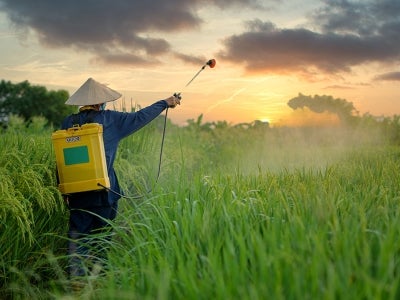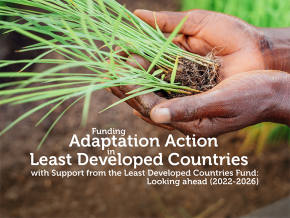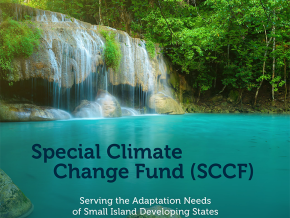
Compost pile with pitchfork tool
Petit Verger Prison is a medium-security prison facility in Pointe aux Sables in Mauritius. The prison has both pre-release and post-release schemes for prisoners, in order to facilitate their rehabilitation within society. The University of Mauritius carried out a waste assessment study at the prison. The results of the study indicated that 52 percent of the total waste generated was yard waste, 38 percent was organic waste, and the rest were paper, plastics and metals. All of the waste primarily ended up in landfills. The Petit Verger Prison has great potential for composting its organic waste, which represents a large proportion of the waste stream. With increasing amounts of waste going to the landfills, there is an urgent need to create and establish a sustainable waste management strategy both at the prison level and in the community. Land filling of waste is considered as the last treatment option in the Integrated Solid Waste Management (ISWM) hierarchy, especially for island environments such as Mauritius. The GEF Small Grants Programme supported Association Kinouété to establish a sustainable waste management scheme to minimize the solid waste going into the landfill.
In addition to SGP, Association Kinouété received support from the University of Mauritius, the Mauritius Prison Service (MPS), Mouvement Civique de Pointe aux Sables (MCPAS) and the local community. Informational pamphlets were distributed to the local community to improve their knowledge and understanding of composting, source-segregation practices, sustainable waste management practices in the Petit Prison and the Pointe aux Sables community, and waste management in Mauritius. This was followed by training sessions for the detainees and prison officers on the basic principles and techniques of composting and compost use.
The prison preformed a windrow composting trial by which the organic and biodegradable material is laid up in long rows. Atics Ltd provided support to the project by offering transportation facilities for green wastes from different collection points in the region of Pointe aux Sables to be carried to the composting site, Petit Verger Prison. Education and awareness programmes were carried out in various establishments and communities to highlight the benefits of waste derived compost and the positive effects of compost use for soil improvement. A monitoring and reporting system has been put in place which helps inform future planning, by highlighting deficiencies in service delivery and identifying areas for improvement.
Around 2 tonnes of waste is generated and collected by the prison for composting on a weekly basis. An estimated yearly collection of green waste is approximately 56 tonnes while the estimated yearly production of compost is in the range of 15 to 20 tonnes. Additionally, greenhouse gas emissions amounting to 44,767 tonnes of CO2 annually have been avoided. Since November 2015 composting has started at Petit Verger Prison and to date nearly ten tons has been produced and used for organic gardening by the Ministry of Environment and other government agencies, in addition to use by Petit Verger Prison. One ton of the compost was donated to the public for the organization of some special events such as Earth Day during the visit of the President of Republic of Mauritius to Petit Verger Prison.
In line with the Mauritius Prison Service’s (MPS) Food Security initiatives, some 50 breadfruit plants were planted at Petit Verger Prison (PVP) in the context of World Food Day 2016. Only compost produced locally from the green waste was used during the plantation. Another 25 breadfruit plants were also planted at the Women’s Prison in Beau Bassin using the compost produced. The demand of this product is rising day by day as the interest of the public is growing in organic farming. The compost is packed in bags of 2.5 kilograms and sold at MUR 25, less than US$1.
The project is being promoted through different platforms in Mauritius, and has been given good exposure by the University of Mauritius at the national and regional level. On August 14, 2014, the project received the Public Service Excellence Award, for their work in adopting modernized methods for a green civil service. The award was granted by the Ministry of Civil Service and Administrative Reforms.
Sustainable waste management requires coordinated and streamlined work at various stages of waste management. This project showcases the success and relatively smooth implementation that follows the use of good practice techniques at every stage, from the point of collection through transport, storage, and treatment to final disposal. Capacity development was critical to the success of this project. Team members were properly trained to understand the problem, work with the challenges involved on a daily basis, and to look for simple approaches for innovative and sustainable solutions. An enhanced earning scheme that provided earnings to detainees also ensured that a dedicated team of detainees would be engaged in this effort. This scheme motivated prisoners by engaging them in productive and constructive activities while they were undergoing their sentence, and inculcated in them a strong work ethic.
This story was originally published in "Community-Based Chemicals and Waste Management" in 2016.


